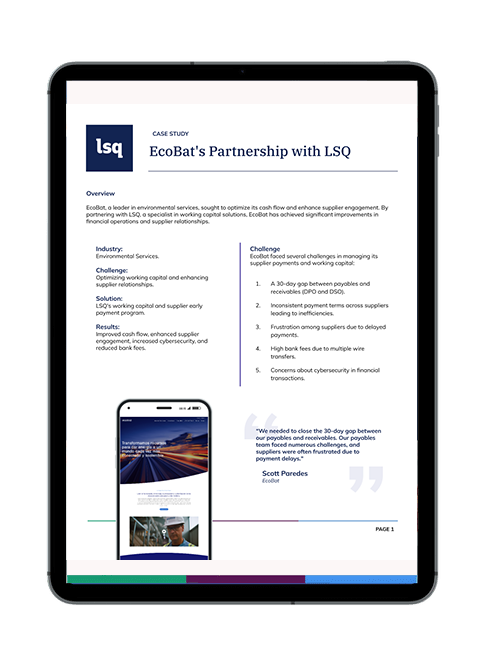Author
Andy Cagle
Share
In 1994, the Texas-based grower began delivering high-quality live goods, mostly greenhouse-grown plants, to some of the largest retailers across the state, including The Home Depot and Walmart. The company had so much success that their business quickly grew to neighboring Oklahoma, Arkansas, and New Mexico.
That growth exploded exponentially when they began selling to Lowe’s, one of the largest home improvement box stores in the country. Today, Lowe’s is the grower’s number one customer and the company has grown to more than 5 million square feet of greenhouse space to accommodate the demand of its buyers.
Working Capital Crunch
In 2017, the grower found itself in a cash-flow crisis when its bank stopped servicing its industry. For more than 20 years, the company had relied on a bank line of credit to manage cash flow and provide liquidity.
“We were with a very large bank that had a group that specialized in lending to greenhouse growers, in particular, in their agribusiness division,” said the company’s president. “They had taken some losses in the division and decided to get out of lending in the greenhouse business.”
Undeterred, the owners sought out another bank to provide financing. However, having such a large concentration of their total business with Lowe’s made traditional funding difficult.
“At the time about 95 percent of our sales were to Lowes,” the president said. So we reached out to a firm that specializes in helping businesses find non-traditional lenders.

“That’s how we found LSQ.”
Starting with AR Finance and Management
They began working with LSQ that same year. They received a $15 million facility and 90-percent advance rate and an inventory line of credit via LSQ’s specialty finance network to continue operations, manage seasonal demand, and stimulate growth.
The LSQ facility was the company’s first experience working with an accounts receivable finance program.
“There was some initial apprehension since we had only used traditional lines of credit and asset-based lending predicated by our receivables and inventory up to that point.”
The company was quickly assuaged by the relationship LSQ built with and the ease of use of the LSQ FastTrack® platform to process invoices and receive early payments.
“It’s very easy,” said the company’s controller. “In fact, our assistant controller was doing the entry in FastTrack within weeks of being hired. It was really easy for her to just jump right in and pick that up.
“Any information that I need, any detail or data that I need, is there (in FastTrack).”
Accounts Payable Finance to Help Meet Seasonal Demand
Today, nearly 70 percent of the grower’s business comes in March, April, May, and June. That means that inventory from their suppliers has to be bought in the winter when cash flow is tight.
“We have certain smaller and overseas suppliers that need their money upfront,” said the president. “We buy containers and shipping racks, and things like that from China that have to be paid for on arrival. It definitely stretched our liquidity.”
To help maintain their cash flow without threatening their supply chain health, the company partnered with LSQ to implement a supply chain finance program in 2019.
With the accounts payable financing, suppliers are able to access on-demand payments through FastTrack and, since the program uses third-party funding, they can hold on to their cash for 90 or 120 days before paying LSQ.
“It (the supply chain finance program) has greatly helped our working capital situation,” the president said. “We used to spend a lot of money building our inventory late fall through the winter. With the LSQ supply chain finance program, we can focus on meeting our payroll and facilities expenses instead of using up our working capital on vendor expenses when we have less cash coming in.”
When they kicked off their supply chain finance program, they had no way of knowing how important the working capital boost to build inventory would be. With the COVID-19 pandemic taking hold a few months later, their buyers saw a huge demand in the spring of 2020 and were able to keep garden centers stocked, something they credits to their relationship with LSQ and the accounts receivable and payable programs.
“The business had a week where we sold $5 million worth of product, and we had never sold more than $4 million in any one week,” said the company’s president. “We didn’t have any trouble drawing on those funds.”
Stay in the loop




![LSQ-merger_Logo_Stacked_white[84]](https://www.lsq.com/wp-content/uploads/2025/02/LSQ-merger_Logo_Stacked_white84-200x97.png)
